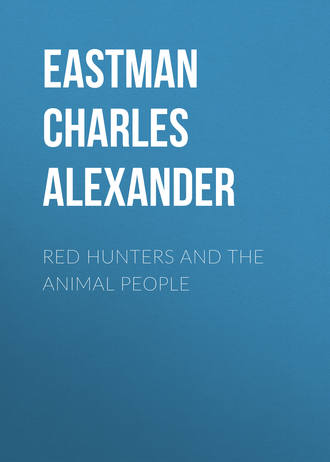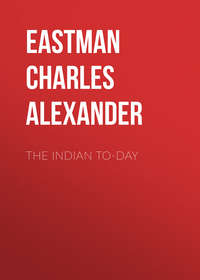 полная версия
полная версияRed Hunters and the Animal People
"It is the way of the beaver," remarked Sheyaka, "not to allow her children to play out-of-doors promiscuously or expose themselves to danger. She does not take them with her to fell trees until they are old enough to look out for themselves. But she brings them all out at night to learn the mother-tricks and trade. She is perhaps the wisest of all the smaller animals."
"The grizzly is an excellent mother of her kind," suggested Kangee. "I once followed a mother bear with two small cubs. As soon as she discovered me, she hastened toward a creek heavily fringed with buffalo-berry bushes. When she disappeared over the bank, I hurriedly followed to see what she would do. She had sent one of the cubs into the thick bushes, and a little farther on she tried to dispose of the other in another good place, but the cub would not obey. It came out each time and followed her. Suddenly she grabbed and threw it violently into a thicket and then ran around the creek and came out almost opposite. There she watched me from under cover."
"Bears, wolves, and foxes," commented old Hohay, "often cuff or slap their young to teach them obedience. Katola might say that the obedience is inborn or instinctive, but it is not. Young animals can be very rude and disobedient to their parents when they are small, but their mothers' training is strict and is continued until they leave them. We Red people have followed their example. We teach our children to respect and obey their elders," concluded the old story-teller.
"The fox is a most orderly eater," Kangee remarked. "Why, she will not allow her children to eat greedily! We know that when she finds a nest full of ducks' eggs – for she is a great egg-stealer – she will drive away the excited young foxes, and roll out egg after egg to each one in turn. Each must wait until she serves him again."
"When I was a young man," said Sheyaka, "I have often called the fox for fun, when I had no intention of harming him. He is a keen and cunning hunter, but easy to fool when you know his weakness. I would imitate the squeaking of the larger field-mouse. He never hesitates, but runs directly to the place where the noise comes from.
"Once I saw him afar off, travelling over a burnt prairie. I lay down in unburnt tall grass, and gave the mouse-call. He came on as if he were very hungry, running at top speed, and I kept squeaking so as to make it seem as if there were many mice.
"When he reached the tall grass he sprang high as he came, and when he jumped clear over me I suddenly gave a war-whoop and waved my blanket. You should have seen how scared he was! He tried to turn back in mid-air and fell almost upon me so that I got hold of his tail. I laughed so hard that I could scarcely keep my hold, but the end of the matter was that he left part of his fine brush with me. I wore it for a long time as a hunting trophy."
The others laughed heartily, but Katola said: "Ugh, you were not fair with him, for you invited him to a feast and then gave him such a fright that he would always hate and fear his brother man."
"That is true; yet at times a hunter can with propriety play a joke upon a fellow-hunter," declared old Hohay.
"It is strange that none of the other animals like the Igmu, the great cat people," remarked Sheyaka, as if he desired to draw out Hohay, who had loosened the buffalo-robe around his loins and settled down with the evident satisfaction of one who has spoken his mind upon a disputed question.
"Toh, they are to the others as Utes to the other Red men," he replied at once. "They are unsociable, queer people. Their speech has no charm. They are very bashful and yet dangerous, for no animal can tell what they are up to. If one sees you first, he will not give you a chance to see so much as the tip of his tail. He never makes any noise, for he has the right sort of moccasins.
"Igmu scatters her family in the summer. The old pair go together; the young go singly until paired. In the winter hunting they often travel within hailing distance, but not like us, the woman following the warrior. One goes up a gulch or creek while the other follows an adjacent creek, and they have a perfect understanding. They feed in common on the game they kill, and unite to oppose a stranger."
"Tell us something of the customs of the larger four-footed people, as the moose, elk, and bison," urged Sheyaka. "But it is time to smoke," he added, as he passed to the old man a lighted pipe.
"Ho, ho, kola; you know an old man's weak points, Sheyaka! I was about to ask for the pipe, but you have read my thoughts. Is it not time for a song? Can you not give us a buffalo or elk song? My stories will move with more life and spirit if you bring the animal people into my presence with your songs."
So Kangee sang a buffalo song, a rude yet expressive chant, of which the words went something like this:
"Ye the nation of the west —A-hay-hay-a-hay!Ye the people of the plains —A-hay-hay-a-hay!The land is yours to live and roam in;You alone are preservers of life —'Tis ordained from heaven that you should preserve our lives!""Oo-oo-oo-oo!" they all joined in the yelps which are the amen of savage song.
Hohay took one or two heavy pulls on the pipe, forcing a column of smoke through his nostrils, and handed it back to Sheyaka. He tightened the robe about him once more, and his wrinkled face beamed with excitement and delight in his subject.
"It is from these large and noble four-footed tribes that we derive many of our best customs," he said, "especially from the elk and buffalo people. But, boy, you have danced well! Your father dances like an old bear – where did you learn the art?"
These savage jokers were highly personal, but jokes were never resented in their life, so Sheyaka laughed heartily and good-naturedly with the rest.
"The buffalo and elk people are among the noblest on earth," continued Hohay, after the laugh was ended. "The grizzly is a drunken, mad fighter, who attacks without reason. He is conceited because he is well armed, and is continually displaying his weapons. The great cat is much more ready to mind his own business, but, after all, he is much of a coward. The wolf warriors are brave where there is meat. All these characteristics are shown also among men.
"The buffalo and the elk fight only for their people and their country. They do not hunt among other tribes, and where they live together in large numbers there are fewer quarrels than among the same number of men together. They never leave their children until they are able to take care of themselves.
"They have made everything possible to us in our free life. They supply us with food, shelter, and clothing, and we in turn refrain from needlessly destroying the herds. Their summer gatherings are the grandest sight I have ever seen.
"But I must stop, friends. There is one sad thing about all this. It has just come into my mind. The wild man is bad enough, but there comes another man – the paleface – who has no heart for what is dearest to us. He wants the whole world for himself! The buffalo disappear before him – the elk too – and the Red man is on the same trail. I will stop here, for it brings me sad thoughts."
He ended, and the others dropped their heads; not a word was uttered after this turn of the Red philosopher's logic. Hohay left the teepee, and the others followed him in silence.
Glossary of Indian Words and Phrases
an-pay´-tu lay wo´-yu-tay wa´-tin-kta mē-che´-chă u´-yay yō, bring me food to-day.
chăn-dee´ ō´-tă, plenty of tobacco.
Chă´-pa, the beaver.
Chă´-pă-wee, the female beaver.
Chăp-chin´-chă, the young beaver.
ē-nă´-kă-nee, hurry.
e-yă´-yă lō, he ran away, he is gone.
ē-yu´-hă nă-hon´ pō, hear ye all.
glē-chu´, come down.
hăn´-tă, look out.
Hă´-yă Tănk-ă, Big Mountain.
Hay´-kinsh-kah, the spoonhorn or bighorn.
hĕ´-chĕ-tu, it is well.
Hĕ-hă´-kă, the elk.
hĕ-hĕ-hĕ, an exclamation of distress.
hē´-nă-kă, wait.
Hē-tunk´-ă-lă, the mouse.
hē-yu´ yō, come here.
Hē-zee´, Yellow Teeth – a nickname.
hī, hī, an exclamation of thanks.
Hĭn-hăn´, the owl.
Hĭn´-pō-hă, Curly Hair – nickname for yearling buffalo cow.
Hĭn-tō´-lă, Blue Hair.
hō, yes – denotes approval, or a salutation.
Hō´-hay, Assiniboine.
Hoo´-tay, Claws or Stubby Claws – nickname for a bear.
Hoo´-yah, the female eagle.
ho-yă´, run of fish.
hō-yay, come on, let us do it.
hu´-kă-hay´, come on.
hŭn-hŭn-hay´, an exclamation of surprise.
Ig-mu´-tănk-ă, the puma.
Ig-tin´, Long Whiskers – a nickname for a puma.
ĭn ah´-jin, stop or stand still.
Kăm-dō´-kă, Slaps the Water – nickname for a beaver.
Kăn-gee´, the raven.
Kă-tō´-lă, Knocks.
kō-lă, or koda, friend.
koo´-wah yay yō, come here.
Mă-kē´-zē-tă, Smoking Earth – name of a river.
Măn´-ĭ-too, the wolf – abbreviation of shunk-man´-i-too.
Mă-tō´, the bear.
Mă-tō´-skă, White Bear.
mă-yă´-lă, a steep place.
mă-yă´-skă, white cliff.
Min-ne-tonk´-ă, Great Water – name of a lake.
Ō-pă´-gē-lă, Fills the Pipe.
Pă-dă´-nee, Pawnee.
Pēz-pēz´-ă, the prairie-dog.
Pēz-pēz´-ă tă ā´-yăn-pă´-hă-lă, the prairie-dog's herald (the owl).
Ptay-săn´-wee, White Cow.
Sē´-chăn-gu, Burnt Thighs – nickname of a band of Sioux.
Shă-ē´-yĕ-lă, Cheyenne.
Shē-yă´-kă, the diver.
Shun-gē´-lă, the fox.
Shun-gē´-lă pă-hah´, Fox Ridge.
Shunk-măn´-ĭ-too, the wolf.
Shunk-tō´-kĕ-chah, the wolf.
Sink-pay´, the musk-rat.
Sin-tāy, Tail – a nickname.
Sin-tay´-hă-dah, Rattle Tail, the rattlesnake.
Sin-tay´-ksă, Bob-tail – a nickname.
tă-chin´-chăn-ă, fawn or lamb.
Tă-dō´-tă, Plenty of Meat.
Tăk´-chă, the deer.
tă-kō´-jă, grandchild.
Tă-tănk´-a, the bull.
Tă-wă´-hink-pay-ō´-tă, Many Arrows.
tee´-pee, lodge.
Tē-ō´-lă, Wounded in the Lodge.
tē-yō´-tee-pee, council-lodge.
tōsh, certainly, of course.
tu-lă´, an exclamation of satisfaction.
tun-kă´-shē-lă, grandfather.
Un-spĕ´-shnee, Don't Know How.
U-păn´-ō-koo-tay, Elk Point; the place where elk are shot.
Wă-coo´-tay, Shoots.
Wă-dē´-tă-kă, Brave.
Wăk-pă´-ē-păk-shăn, Bend of the River.
Wăk-pă´-lă shē´-chă, Bad River.
Wăm-be-lee´, the eagle.
Wăsh-ă´-kă, strong.
Wăsh-tay´, good.
Wă-su´-lă, Little Hail.
Wă-zee´-yah, the god of cold or winter; the north.
Wē-chah´, the raccoon.
Wē-chah´-tă-wee´, February – the coon's month.
Wē´-tă-ō´-tă, Lake of Many Islands.
woo, woo, a war-whoop.
wō´-pă-tă, place of killing or dressing game.
Zē-chah´, the squirrel.
Zu´-yă, warrior.
THE END



